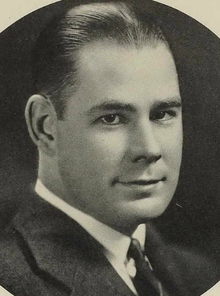This article needs additional citations for verification. (August 2021) |
 Neyland from the 1940 Volunteer | |
| Biographical details | |
|---|---|
| Born | February 17, 1892 Greenville, Texas, U.S. |
| Died | March 28, 1962 (aged 70) New Orleans, Louisiana, U.S. |
| Playing career | |
| 1913–1916 | Army |
| Position(s) | Lineman |
| Coaching career (HC unless noted) | |
| 1919–1924 | Army (assistant) |
| 1925 | Tennessee (assistant) |
| 1926–1934 | Tennessee |
| 1936–1940 | Tennessee |
| 1946–1952 | Tennessee |
| Administrative career (AD unless noted) | |
| 1936–1941 | Tennessee |
| 1946–1962 | Tennessee |
| Head coaching record | |
| Overall | 173–31–12 |
| Bowls | 2–5 |
| Accomplishments and honors | |
| Championships | |
| As coach:
As player:
| |
| Awards | |
| Amos Alonzo Stagg Award (1957) 4× SEC Coach of the Year (1936, 1938, 1950, 1951) | |
| College Football Hall of Fame Inducted in 1956 (profile) | |
Robert Reese Neyland (KNEE-lənd;[1] February 17, 1892 – March 28, 1962) was an American football player and coach and officer in the United States Army, reaching the rank of brigadier general. He served three stints as the head football coach at the University of Tennessee (UT) from 1926 to 1934, 1936 to 1940, and 1946 to 1952. He is one of two college football coaches to have won national titles in two non-consecutive tenures at the same school, along with Frank Leahy of the University of Notre Dame. Neyland holds the record for most wins in Tennessee Volunteers history with 173 wins in 216 games, six undefeated seasons, nine undefeated regular seasons, seven conference championships, and four national championships. At UT, he reeled off undefeated streaks of 33, 28, 23, 19, and 14 games.
Neyland is often referred to as one of the best, if not the best, defensive football coaches ever. Sports Illustrated named Neyland as the defensive coordinator of its all-century college football team in its "Best of the 20th Century" edition.[2] 112 of his victories came via shutout. In 1938 and 1939, Neyland's Vols set NCAA records when they shut out 17 straight regular season opponents for 71 consecutive shutout quarters. His 1939 squad is the last NCAA team in history to hold every regular season opponent scoreless.[citation needed]
Neyland was also an innovator. He is credited with being the first coach to utilize sideline telephones and game film to study opponents. His teams also were some of the first to wear lightweight pads and tearaway jerseys. Such measures increased his players' elusiveness and exemplify Neyland's "speed over strength" philosophy. Neyland is also famous for creating the seven "Game Maxims" of football that many coaches, on all levels, still use. Tennessee players recite the maxims before every game in the locker room as a team.
Neyland Stadium at UT is not only named for The General, but its present form was designed by him. The plans he drew up for a major expansion shortly before his death formed the basis for all expansions that brought the stadium to its modern size with an over 100,000 seat capacity. Neyland was inducted into the College Football Hall of Fame as a coach in 1956.
On November 12, 2010, a 9-foot (2.7 m), nearly 1,500-pound (680 kg) bronze statue of General Neyland was unveiled between gates 15A and 17 at Neyland Stadium. The statue, which was commissioned by artist Blair Buswell, is twice life-size. Since Neyland is portrayed in the kneeling position rather than standing, the statue is 9 feet (2.7 m) tall (a standing statue would have stood 12 feet (3.7 m) tall). The base is 57 by 87 inches (140 by 220 cm) and features Neyland's well-known seven Game Maxims engraved into the precast.
- ^ ""KNEE-land, LIKE MY KNEE" | the Vol Historian | GoVolsXtra.com". Archived from the original on June 11, 2013. Retrieved December 16, 2011.
- ^ "CNN/SI - Century's Best - SI's NCAA Football All-Century Team - Wednesday October 06, 1999 03:30 PM". Sports Illustrated. October 6, 1999. Retrieved December 28, 2009.
